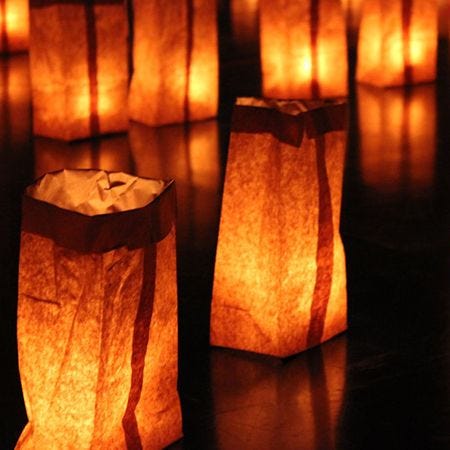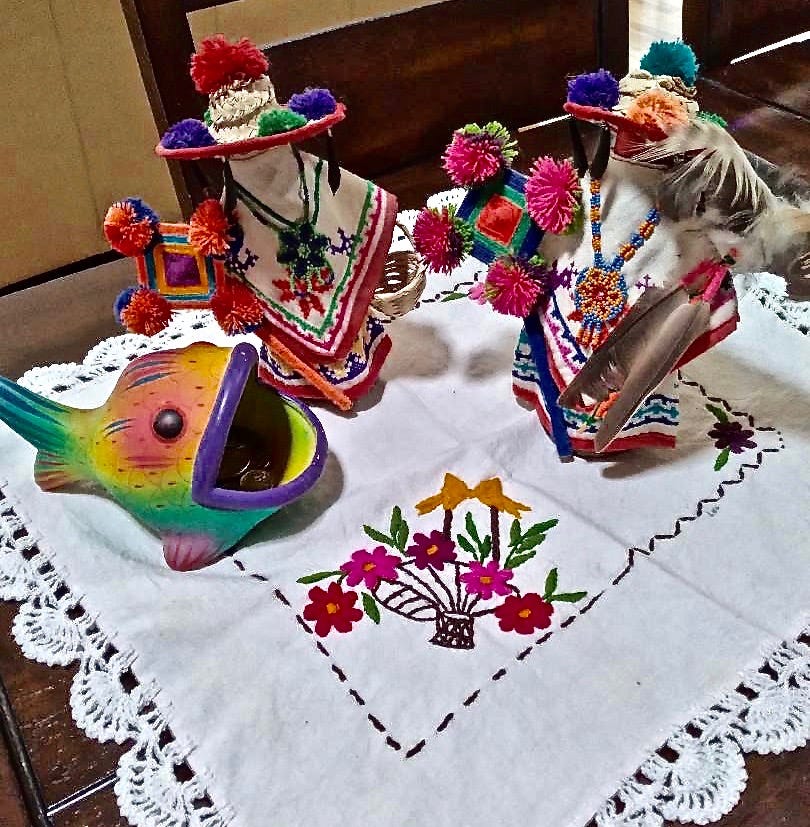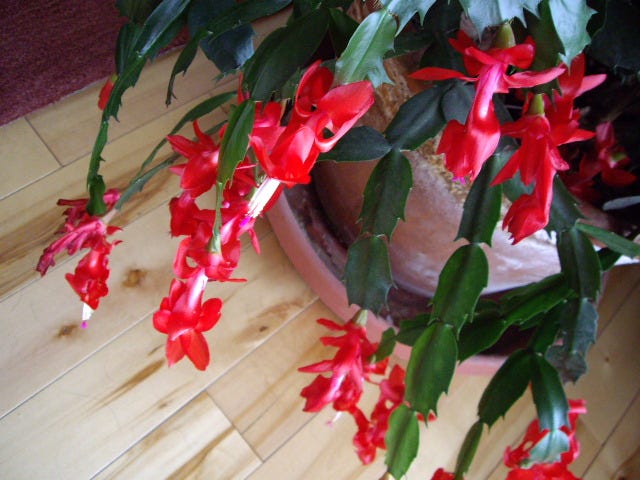Saturday Special: Las Posadas in Truckee
An English tutor is honored by an invitation to participate in Las Posadas.
For about seven years, I coordinated a literacy/ESL program at the library in Truckee, CA and tutored dozens of learners from the local Mexican community. I was proud of the program we had built, but had no idea the impact I personally made because I met my learners in their homes each week for private lessons in English.
Susan Bruno, who ran the Head Start preschool in town, informed me that the word was out: "There's a lady in town who will come to your house to teach English." Heck, I didn't really think it mattered that much except that it was difficult for many to come to the library for lessons, especially during our snow-bound winters. Only Jorge would brave the slush and traffic on his bicycle to come to the library.
Frankly, I enjoyed going to my learners' homes, meeting their families, hearing about their struggles and successes. Mind-blowing stories too. During one lesson, Elena told me how she handed her infant daughter to a coyote to bring into the United States. Eventually, mother and child reunited and came to Truckee for work. That daughter stood next to me as her mother told the story. I marveled at the courage it took to trust one's baby to a stranger whose only concern was making money from desperate people.
One of my favorite learners, Leticia, stayed with her cousin and babysat her children. She was a young teenager at the time. Answering a knock on the door, she met a pair of immigration officers who instantly swept her away and dumped her in the middle of a border town. No money. No contacts. No way to call her cousin to tell her what happened. She eventually returned to the U.S., married, and started her own daycare center in Truckee. She was so successful, she opened a second place to tend the many children of tourists visiting the resorts.
Among the perks of working with my learners was a home-made burrito or other food given in gratitude for help in mastering English. Jorge gave me a Christmas cactus and a tiny schefflera. The cactus grew huge but finally died mysteriously. The schefflera, however, has taken over a corner of our sitting room and requires an occasional chopping now and then. When these plants find a commodious place to grow, they will expand to fill whatever space there is. Each time I throw a quart of water into its barrel, I think of Jorge and his dedication to making a new life for himself. Not only was he a magician with plants, he also taught classes in computer use to immigrants in town.
It was wonderful to meet these people. The progress they inspired me and gave me great joy to be a small part of their success.
Then, Susan invited me to celebrate Las Posadas with the residents of an apartment complex in town. I knew it well. One of my favorite families lived there: Olivia and her four rambunctious children. I also tutored her mother, Chela, who rode herd on the children while Olivia worked. Chela also worked early mornings in the breakfast room of one of the hotels.
A teacher's aide at the high school introduced me to Olivia, my first literacy student. Olivia already spoke English fluently, having graduated from the high school. When I started with her, she worked as a residential housekeeper. Over the years, she took courses to become a nurse's assistant. I'll bet by this writing, she's embarked on a full nursing career.
Over time, my literacy list included many more of her aunts, uncles, and cousins, including one poor man, an attorney in Mexico, who spent his first day toiling at his cousin's cement business. When I met him, a patina a dust covered his arms and clothes. He held up his hands as if wanting someone to wrap them in gauze. After that, I never saw him again. He returned to Guanajuato with his teenaged nieces who were unimpressed with life in Los Estados Unidos. They missed their friends back home.
Many of my learners owned land and houses in Mexico. Olivia's father tried many different crops and animals at their family ranch, but succeeded at none of them. As with many immigrants, they were cash poor and came to the U.S. for the income to support families left in Mexico. In Truckee, they clustered in apartments and trailer parks, as well as renting and sometimes even buying houses. It appeared to me that most of them sincerely wanted to establish homes in El Norte and worked hard to achieve their goals.
They also wanted to give their children an expanded education. In Mexico, most people attend public school until sixth grade. After that, secondary education is far too expensive. Jorge was the only one who had gone as far as university to attain a computer science degree. Without English, however, he would never be able to be more than a gardener, and even at that, he was a resourceful entrepreneur. We spotted him once having lunch with a group of men at the Panda Express. I assumed he was el jefe because he paced around, cell phone in hand, talking to someone with great confidence.
Mexican immigrants also want to keep cultural traditions alive for their children, including Las Posadas, the annual observance of Joseph and Mary traveling to Bethlehem, which is celebrated throughout the Hispanic world from Dec. 16 through Christmas Eve.
Mary and Joseph's journey was an arduous trek of about ninety miles from Nazareth to Bethlehem. Covering this distance in four days, they had to travel 2.5 miles per hour to go twenty miles a day. Mary, advanced in her pregnancy, endured the rocking motion of a donkey through the bitterly cold desert. Already there were hordes of people in Jerusalem to be counted in the census. All the hostelries were occupied, but they found accommodation in a stable in Bethlehem six miles to the south.
Las Posadas takes celebrants through a more festive version of this trip by walking house-to-house, reciting a script that portrays Joseph's anguished pleas for shelter and comfort for Mary.
Our celebration fell upon a frigid night where clear skies revealed a universe of stars, including the brilliant Milky Way. Indeed, it mirrored our procession along the sidewalks of the complex. Wisps of our breath filled the air as we sang Descolores.
Each home we visited opened their doors to the recitation, but only for a brief visit. There were far too many of us following the cheerful luminarios, tiny paper bags flickering with the glow of votive candles. I can't remember whether candy was passed around to the shivering crowd, but I do remember the children's voices singing sweetly in the night heralding this occasion.
Finally, we ended up in the party room where warm drinks, food, and a colorful star-shaped piñata awaited us. It was quite the mad scramble when a youngster broke the piñata. The children played with the simple toys they retrieved from this game; and the cadence of Spanish filled the room. I was pleased just to sit and watch, enjoying the ambiance and hospitality that I'd experienced in other gatherings. I sometimes felt like the anthropologist in the corner, observing and scribbling notes. Did the invitation to share in Las Posadas signal that I was, in some small way, now part of the community? I don't know. Whatever my status was, I learned so much from them all.
I have learned that they were incredibly patient with my haphazard Spanish. I learned more Spanish than my students learned English, I'm quite certain of that, but my Spanish was never more than poor syntax gibberish. Somehow, they understood what I meant, although I couldn’t help but wonder if their smiles were actually grimaces. God bless them all!
Also, and quite willingly, I gained several pounds on Mexican home cooking. One day, I watched in awe as Carmen stirred the makings for flan in a gigantic earthenware olla. It stood about a foot or so tall and was decorated in brilliantly colored flowers.
To my chagrin, I learned that if I just happened to point to some little figurine on a shelf and said it was lovely, it soon landed in my hands as a gift. This took me by surprise and felt really awkward. I was just sayin' …! Social skills have never been my strong suit, especially when navigating the intricate and sensitive pathways between cultures. Again, they were exceedingly patient.
Much later, a friend explained to me that giving things away like this was customary. Attachment to such objects is not strong; it's more important to make others happy. If that little figurine pleases you, it's yours. I still have these items and cherish them. A pair of little dolls, los abuelitos, dressed in beaded and embroidered muslin with feathered caps, and a pottery fish with a gaping mouth where my husband tosses his pocket change. I love these little gifts and the people who enriched my life far more than I did theirs. Their stories, their lives, and their culture were filled with beauty, courage, and generosity.
I was more than honored to be invited to celebrate Las Posadas with them. More than anything, I hope they are doing well and succeeding at their goals.
Feliz Navidad!
Here's an article about the journey of Mary and Joseph to Bethlehem, written by Nicole DePue, a graduate of Jerusalem University College.
Christmas Cactus
A gift from Jorge
struggling to learn English
so grateful for a tutor
un regalo para ti
Small and spiny deepest green
only took a weekly watering
quickly grew from porcelain bowl
to a huge terra cotta pot.
Upon the Solstice
blossoms burst in riots of red
and Jorge said,
Merry Christmas.
If you enjoyed this essay and poem, please feel free to explore other writings in the Ring Around the Basin Archives.







I always wanted to teach ESL but my deafness prohibited it.